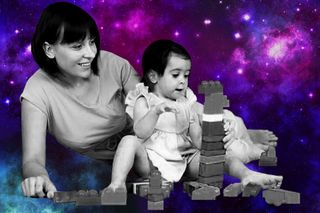
For Families of Kids with Autism, ADHD, Society Is More Difficult Than the Parenting
“It’s an unwelcome feeling, really.”

Last year, the Bombay High Court refused to allow a 16-year-old autistic boy to sit for Class X board exams and suggested that his parents admit him to a school that caters to special needs.
The boy’s father had then said, “He has been studying in the same school since he was in the First Standard. If we are forced to shift him to another school now, he will lose a full year.”
One in every 68 children get diagnosed with autism in India, according to Autism Centre for Excellence (ACE). That totals it to more than 10 million kids for whom there are only about 15 autism-specific schools in India, according to Rehab Council. As far as all other learning disabilities are concerned, a 2012 Times of India states that about 10% of Indian children suffer from them.
And non-cooperation from mainstream schools and institutions is just one of the many problems parents face when it comes to raising a child with special needs, especially children with ADHD or autism.
*
Children with special needs like ADHD and autism don’t lack intelligence or motivation — most of them are as smart as everyone else — but their brains are simply wired differently. This difference affects how they receive and process information; they see, hear, and understand stimuli differently. Children with ADHD, or Attention Deficit Hyper Disorder, may have problems with sitting still and focusing, whereas children with autism may have trouble communicating, reading body language, learning basic skills, making friends, and making eye contact.
“Although schools need to ensure that no child with special needs is denied admission in mainstream education, children with learning disabilities constantly get referred to special schools,” says Gopika Kapoor, lead therapist at Ummeed Child Development Center. “Most parents of kids with autism and other forms of learning disabilities say they want their kids to attend mainstream school, alongside children who don’t have learning difficulties — but with very few schools willing to co-operate, one of the problems parents say is that they are forced to homeschool their children.”
A principal with a kindergarten facility in Mumbai, on a condition of anonymity said supporting children with learning disabilities isn’t about a lack of will, but about a lack of resources. “For most schools, this kind of an exercise is practically impossible because of the number of students and lack of resources,” the principal said.
In the face of such messages, many parents have trouble determining what is a cloak for discrimination and what is an actual gap in support that might affect their child’s success. In this state of in-between, some choose homeschooling.
“Why wouldn’t we want our kids to be socialized normally? As a parent, I would want my son to be educated in a mainstream school,” said Jina Sahay, a parent involved with the Autism Network in Mumbai. Sahay homeschools her son. “But as autism is a spectrum disorder, it also depends on whether the child is capable of coping in a mainstream school. I don’t want my son to face unnecessary stress.”
Article continues below
For instance, for Leena Kapoor, who has 7-year-old twins, one of whom is autistic and the other typical, the main problem she says she faces is in understanding her child’s needs, which are constantly in flux and influenced by age and with expectations at home, in social settings, and in school, if they are going to one. “Every day, new and unexpected problems may arise as they do with all children. However, youngsters with special needs often require more understanding and support, not only from parents and teachers but also from siblings and we deal with them on an every day basis.”
The extra consideration one child requires can take a toll on families. While Kapoor says her twins are treated similarly at home, with equal responsibilities, she adds “It’s not unusual to experience ambivalent feelings towards your child: sometimes you feel supportive, loving and patient; other times you feel frustrated and discouraged.”
*
“Simply put, what happens in the family affects each child, and what happens with each child affects the family,” says Urmila Karanjia, director of Autism Network, an NGO for autistic children in Mumbai.
Shaping family life around one child, even when it’s unavoidable, can cause friction — “In families with a child maybe autistic or has ADHD, family conflicts or conflicts with the partner may be more prominent and disruptive and that’s what the child needs shielding from,” says Tamanna Punjabi, the mother of a 6-year-old with ADHD — but it can also make it difficult to recognize when the focal point is not the source of conflict.
“We used to constantly have fights at home, constantly placing the blame on our child thinking he was the root of every problem, every fight,” says Usha Kulkarni, the mother of an 8-year-old with autism. “However, on analyzing, we realized it was also stress from work, managing the house, not spending enough off time with the partner and most importantly, not asking for his help.”
For some, the experience of parenting a special needs child can be isolating, making support from partners and other family members all the more important — but also a greater source of stress in the absence of other support networks.
For instance, when it comes to socialization, “for children with LDs, interacting with other children [may] become difficult, but so it does for parents, too,” says Karanjia. “It can alienate and isolate parents from other parents or from doing things they are usually used to.”
This can eventually negatively affect the emotional and psychological state of the whole family, as it did for the Davars, who have a 10-year-old child with ADHD. “Since no school was willing to admit him, we had to homeschool our son, which means no group of friends and no intermingling with other parents.
That societal isolation is driven home by societal reactions to their families, say parents.
“What I would really want for people to understand is that he is my son and this is my life. It isn’t a bed of roses but we try to make the best of every day,” says Sheena Kaur, whose 6-year-old has autism. “It would help if people gave us space, because we’re in the middle of a situation they won’t know how to deal with and we find it intrusive if you come and give us a piece of advice that will work on your child but not mine.”
“Even if we’d go to the building park to play, it would invite stares, not just from children, but from parents as well — when adults should be the last ones to do so,” says Benaifer Davar. “Sometimes strangers decide for themselves that my son is a badly behaved child and that I am inadequate mother. It’s an unwelcome feeling, really.”
This is the real difficulty, says Kaur — not the special needs of her child. “It would help if people responded kindly, not judgmentally. If instead of saying ‘at least it’s not cancer,’ they’d ask how can they help, or what do we need, and just not stare — more than the child, it makes us uncomfortable,” she says.
Anubhuti Matta is an associate editor with The Swaddle. When not at work, she's busy pursuing kathak, reading books on and by women in the Middle East or making dresses out of Indian prints.
Related


Your Perfume Might Be Behind the Global Trend of Early Puberty
